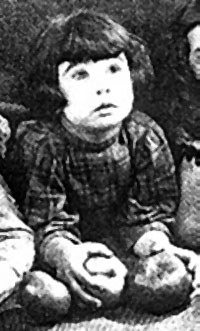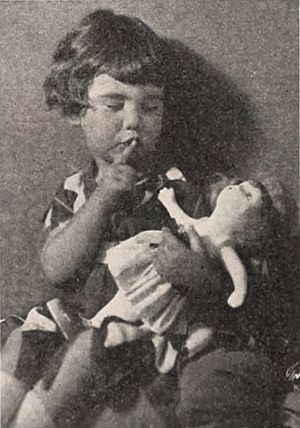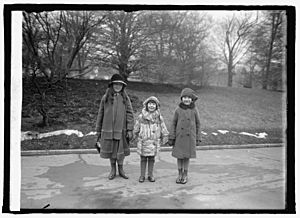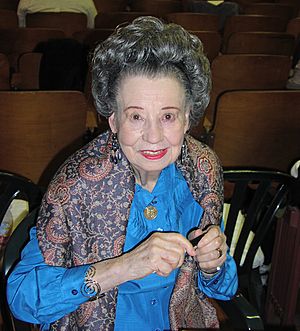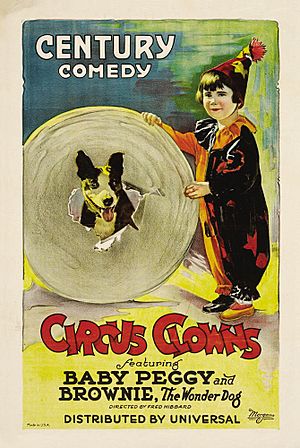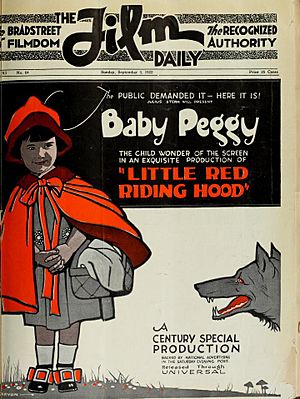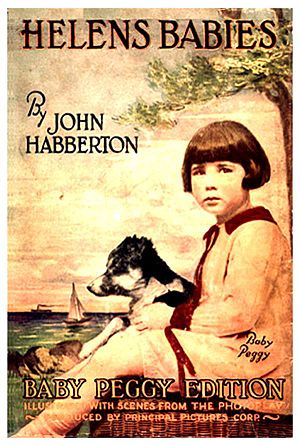Diana Serra Cary facts for kids
Quick facts for kids
Diana Serra Cary
|
|
|---|---|
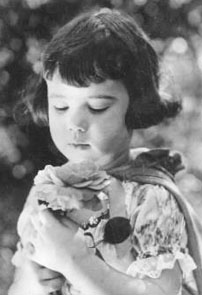
Baby Peggy, circa 1922
|
|
| Born |
Peggy-Jean Montgomery
October 29, 1918 San Diego, California, U.S.
|
| Died | February 24, 2020 (aged 101) Gustine, California, U.S.
|
| Other names | Baby Peggy Baby Peggy Montgomery Peggy Montgomery Peggy Jane Diana Ayres |
| Education | Lawlor Professional School Fairfax High School |
| Occupation |
|
| Years active | 1921–1938 |
| Spouse(s) |
Gordon Ayres
(m. 1938; div. 1948)Bob Cary
(m. 1954; died 2001) |
| Children | 1 |
Diana Serra Cary (born Peggy-Jean Montgomery; October 29, 1918 – February 24, 2020), known as Baby Peggy, was a famous American child actress. She starred in many silent films, which were movies without sound. She was also a vaudeville performer, an author, and a historian who studied silent films. Baby Peggy was the last living person who had a big career in silent movies.
Baby Peggy was one of the three most famous child stars in Hollywood's silent film era. The other two were Jackie Coogan and Baby Marie. Between 1921 and 1924, she made over 150 short films. In 1922, she received more than 1.2 million fan letters! By 1924, people called her The Million Dollar Baby. This was because she earned $1.5 million a year, which was a huge amount of money back then. Sadly, her parents did not manage her money well. By the time she grew up, she was poor and worked as an extra (a background actor) in the 1930s.
Later in life, Peggy became an author and a historian. She wrote several books, including her historical novel The Drowning of the Moon. She also worked to protect the rights of child actors.
Contents
Early Life and Name
Diana Serra Cary was born on October 29, 1918, in San Diego, California. Her birth name was Peggy-Jean Montgomery. She was the second daughter of Marian and Jack Montgomery. Her older sister was named Jack-Louise, but everyone called her Louise or Jackie.
When Peggy-Jean was born, some people suggested the name Margaret. However, her parents liked Peggy-Jean better and decided to keep it.
Her Acting Career
Becoming a Star
Baby Peggy was "discovered" when she was only 19 months old. She visited Century Studios in Hollywood with her mother and a friend. Her father, Jack, was a stuntman. He used to work with famous cowboy actor Tom Mix.
The director, Fred Fishback, was impressed by how well-behaved Peggy was. He hired her to act in short films with a dog star named Brownie the Wonder Dog. Their first film, Playmates (1921), was a big hit. After that, Peggy signed a long-term contract with Century Studios.
Between 1921 and 1924, Peggy made about 150 short comedy films. Her movies often made fun of popular films, social issues, and famous stars. For example, in Peg O' The Movies, she made fun of actors Rudolph Valentino and Pola Negri. She also acted in movies based on books and fairy tales, like Hansel and Gretel and Jack and the Beanstalk.
In 1923, Peggy started working for Universal Studios. Here, she appeared in longer, more serious films. Some of these movies included The Darling of New York and Captain January. Her films at Universal were called "Universal Jewels." This meant they were the studio's most important and expensive movies. She also starred in Helen's Babies with Clara Bow.
Fame and Money
Baby Peggy's films made her very famous. When she wasn't filming, she traveled all over the country. She would appear in person to promote her movies. She also performed short skits on big stages in Los Angeles and New York City. Her face appeared on magazine covers and in advertisements. She was even named the official mascot of the 1924 Democratic National Convention. She stood on stage waving a flag next to Franklin Delano Roosevelt.
By the age of 5, she had her own line of products. These included dolls that looked like her, sheet music, jewelry, and even milk!
Peggy earned a lot of money. By 1923, she had a contract for $1.5 million a year at Universal. On her vaudeville tours, she made $300 a day. However, her parents handled all the money. They spent it on expensive cars, homes, and clothes. They did not save any money for Peggy or her sister's future or education. Peggy herself only got a nickel for each vaudeville show.
Because of their careless spending and bad business partners, all of Peggy's money was gone before she became a teenager. Later, when another child star, Jackie Coogan, sued his parents for his earnings, Peggy's parents asked her if she would do the same. Peggy decided not to, believing it wouldn't help. Cases like hers and Jackie Coogan's led to the Coogan Act. This law helps protect child actors' earnings.
Working Conditions
Peggy's working conditions were very tough. As a toddler, she worked eight hours a day, six days a week. She often had to do her own stunts. This included being held underwater until she fainted and escaping from a burning room. She also rode underneath a train car for a film.
Peggy and her sister Louise did not go to school regularly. They only started attending school later, at Lawlor Professional School. This school had flexible hours for child actors.
Peggy's father controlled her career completely. He went with her to the studio every day and made all decisions about her contracts. He often said that Peggy's success came from her ability to follow orders without question.
End of Film Career and Stage Work
Baby Peggy's film career ended suddenly in 1925. Her father had an argument with producer Sol Lesser about her salary. He canceled her contract. Because of this, she was mostly blacklisted from Hollywood. She only got one more small role in a silent film, April Fool in 1926.
From 1925 to 1929, Peggy had a successful career performing in vaudeville shows. Her act included comedy, singing, and dramatic monologues. It became very popular. Peggy and her family toured the United States and Canada, performing in big theaters.
While touring, Peggy often got sick with tonsillitis and other illnesses. But she kept working. She wrote that sometimes she was so sick, she had to throw up in buckets backstage before and after her performances. Her mother worried about her health, which was another reason they stopped touring.
Peggy's parents continued to spend too much money, even after her film career ended. They wasted much of the $2 million she had earned. Her father planned to buy a ranch, but the stock market crash of 1929 stopped his plans. The family had to sell their home in Beverly Hills. They moved to a rural area in Wyoming.
Peggy liked the quiet life in Wyoming. She hoped her stage days were over. However, the family struggled to make money. As a last resort, they returned to Hollywood in the early 1930s. Peggy, who was a teenager by then, was not happy about it. She said that she was paid three dollars a day as an extra. Many other silent film stars she knew were also working as extras.
Peggy retired from acting soon after appearing in Having Wonderful Time in 1938.
Life After Acting
Peggy married Gordon Ayres in 1938. A few years later, she changed her name to Diana Ayres. She wanted to move away from her "Baby Peggy" image. She was working as a writer for radio shows. But people were more interested in her past as Baby Peggy than her writing. Later, she changed her name again to Diana Serra Cary. Serra was her confirmation name when she became Catholic.
After acting, she worked as a switchboard operator, a bookstore clerk, and a gift shop manager. Then she started writing freelance.
After many years, Cary finally made peace with her past as Baby Peggy. She had successful careers as a publisher, historian, and author. She wrote books about early Hollywood and the tough working conditions for child stars. Her autobiography was called What Ever Happened to Baby Peggy: The Autobiography of Hollywood's Pioneer Child Star. She also wrote a biography about Jackie Coogan.
As an adult, Cary wrote many books about the early film industry. She also spoke out for better laws to protect child performers. She was a member of an organization called "A Minor Consideration."
Cary appeared in many TV documentaries and interviews. She also made guest appearances at silent film festivals. When she was 99 years old, she published her first novel, The Drowning of the Moon.
Personal Life and Death
When she was seventeen, Peggy ran away from home. She wanted to escape the film industry and her parents' plans. She married actor Gordon Ayres in 1938. They divorced in 1948. In 1954, she married artist Robert "Bob" Cary. They had one son, Mark. They were married until Bob Cary's death in 2001.
Diana Serra Cary lived in Gustine, California, for many years. She passed away at her home in Gustine on February 24, 2020, at the age of 101.
Honors and Recognition
On November 8, 2008, just after her 90th birthday, Cary was honored at the Edison Theatre in Niles, California. Two of her films, Helen's Babies and Captain January, were shown.
Diana Serra Cary's handprints and signature are saved in cement outside the Vista Theater in East Hollywood. Her film "Tips" was the first movie shown there when the cinema opened in 1923.
Since 2012, people have tried to get Cary a star on the Hollywood Walk of Fame. They even started a crowdfunding campaign, but it has not happened yet. On December 3, 2012, Turner Classic Movies showed a documentary about her called Baby Peggy: The Elephant in the Room.
In 2018, Cary received the Cinecon Legacy Award at the 54th Annual Cinecon Classic Film Festival. They also showed a restored version of Helen's Babies.
Her Films
Most of Baby Peggy's films have been lost over time. Records about their making are also gone. Century Studios, where she made many films, burned down in 1926. Also, another older actress named Peggy Montgomery was active around the same time. This sometimes causes confusion about which films belong to which Peggy.
A few of Baby Peggy's short films have been found and saved. These include Playmates, Miles of Smiles, and Sweetie. They are kept in film archives around the world. Her full-length films The Family Secret, April Fool, Captain January, and Helen's Babies have also survived. They have been restored and are available to watch. In 2016, her lost 1924 film Our Pet was found in Japan.
Filmography
Here are some of the films Baby Peggy appeared in:
| Year | Title | Role | Notes |
|---|---|---|---|
| 1921 | Her Circus Man | ||
| 1921 | On with the Show | ||
| 1921 | The Kid's Pal | ||
| 1921 | Playmates | Credited as Peggy Montgomery | |
| 1921 | On Account | ||
| 1921 | Pals | ||
| 1921 | Third Class Male | ||
| 1921 | The Clean Up | ||
| 1921 | Golfing | ||
| 1921 | Brownie's Little Venus | ||
| 1921 | A Week Off | ||
| 1921 | Brownie's Baby Doll | ||
| 1921 | Sea Shore Shapes | ||
| 1921 | A Muddy Bride | ||
| 1921 | Teddy's Goat | ||
| 1921 | Get-Rich-Quick Peggy | ||
| 1921 | Chums | ||
| 1922 | The Straphanger | Unconfirmed | |
| 1922 | Circus Clowns | ||
| 1922 | The Little Rascal | ||
| 1922 | Fools First | Little girl | |
| 1922 | Little Red Riding Hood | Little Red Riding Hood | |
| 1923 | Peg o' the Movies | Peg | |
| 1923 | Sweetie | ||
| 1923 | The Kid Reporter | Peggy | |
| 1923 | Taking Orders | ||
| 1923 | Nobody's Darling | ||
| 1923 | Tips | ||
| 1923 | Little Miss Hollywood | Little Miss Hollywood | |
| 1923 | Miles of Smiles | The Twins (dual role) | |
| 1924 | Our Pet | ||
| 1924 | The Flower Girl | ||
| 1924 | Stepping Some | ||
| 1924 | Poor Kid | ||
| 1923 | Hansel and Gretel | ||
| 1924 | Jack and the Beanstalk | ||
| 1924 | Such Is Life | ||
| 1924 | Peg o' the Mounties |
| Year | Title | Role | Notes |
|---|---|---|---|
| 1921 | Fool's Paradise | Child | Uncredited |
| 1922 | Little Miss Mischief | ||
| 1922 | Penrod | Baby Rennsdale | Credited as Peggy Jane |
| 1922 | Peggy, Behave! | Peggy | |
| 1923 | Hollywood | Herself (cameo) | Lost film |
| 1923 | Carmen Jr. | ||
| 1923 | The Darling of New York | Santussa | Credited as Baby Peggy Montgomery |
| 1924 | The Law Forbids | Peggy | |
| 1924 | Captain January | Captain January | |
| 1924 | The Family Secret | Peggy Holmes | |
| 1924 | Helen's Babies | Toodie | |
| 1926 | April Fool | Irma Goodman | |
| 1926 | The Dangerous Dub | Rose Cooper | |
| 1926 | Prisoners of the Storm | Joan Le Grande | |
| 1932 | Off His Base | Peggy | Credited as Peggy Montgomery |
| 1934 | Eight Girls in a Boat | Hortense | Credited as Peggy Montgomery |
| 1934 | The Return of Chandu | Judy Allen, party guest | Uncredited |
| 1935 | Ah, Wilderness! | Schoolgirl at graduation | Uncredited |
| 1936 | Girls' Dormitory | Schoolgirl | Credited as Peggy Montgomery |
| 1937 | Souls at Sea | Bit Role | Uncredited |
| 1937 | True Confession | Autograph Hunter | Uncredited |
| 1938 | Having Wonderful Time | Extra | Uncredited Alternative title: Having a Wonderful Time |
See also
 In Spanish: Diana Serra Cary para niños
In Spanish: Diana Serra Cary para niños
 | Bayard Rustin |
 | Jeannette Carter |
 | Jeremiah A. Brown |


